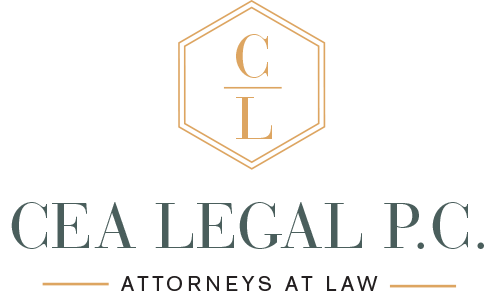How can CEA LEGAL P.C. help you?
Below you will find answers to some frequently asked questions (FAQ's), if you have a question that is not answered here please use the contact us page.
1 – What are the most common rights in connection with transfers of the shares of a corporation or of the membership interest units of a limited liability company?
Right of first refusal – the right of a current shareholder or of a member to match the offer made by a third party to purchase another shareholder’s shares or member’s units;
Right of first offer – the right of a current shareholder or of a member to purchase new shares or units before the company can offer them to a third party;
Drag Along Rights – the right of the majority (whether a simple or a super majority) of a company to accept an offer from a third party to purchase all the outstanding shares or units of the company and to force the minority to accept the sale on the same terms;
Tag Along Rights – the right of the minority of a company to sell its shares or units at the same terms negotiated by the majority for its shares or units.
2 – How much do you need to invest to get an E2 Investor Visa?
There is no minimum established. The regulations say that the investment needs to be substantial – therefore the minimum amount is relative to the specific industry. To be deemed substantial, the investment needs to be:
a) proportional to the value of the business, or
b) enough to guarantee the creation of a new business.
3 – What are the most significant clauses negotiated in a contract of sale of New York City Condominium Unit?
Down payment percentage – Typically it is 10% of the Purchase Price. The Seller might try to get more (20%-25%), in this case the Buyer should demand a lower percentage.
Mortgage contingency – The Buyer’s exit strategy in place in case the financing is not approved.
Warranties and Representations in connection with the condition of the property – Units are sold “as-is”, but the buyer should try to get coverage from pre-existing hidden damages/issues.
4 – How do you overcome restrictive covenants, such as non-competition and non-solicitation clauses?
Non-compete and non-solicitation provisions will be hardly enforced in Court unless narrowly tailored, meaning that the restrictions imposed should be reasonable in duration, geographic scope and substance and necessary to serve a legitimate interest of the other party.
5 – Are the principals of a business personally liable to the Landlord under the terms of a New York commercial lease?
In New York, if the lease is terminated earlier than originally scheduled, principals are not personally liable as long as they comply with the provisions of the “Good Guy Guarantee”, namely:
a) Landlord receives sufficient notice of termination (between 90 and 180 days);
b) the premises vacated are in “broom-clean” condition; c) rent is paid through the date of surrender.
6 – Are Cryptocurrencies securities regulated by the U.S. Securities and Exchange Commission (SEC)?
Cryptocurrencies are digital tokens that might fall under the purview of the SEC (and therefore comply with its stringent requirements) when the investor finalizes the purchase with a goal to obtain profits expected to arise from the effort of a third party. On the other hand, when a cryptocurrency is purchased in order to be spent within a certain blockchain platform, it loses the features of a “security” investment, remaining a “utility” token.
7 – Buy-Sell Agreements?
Buy-Sell Agreements are stand-alone agreements or provisions within a shareholders/operating agreement that govern the transfer of shares or membership interests in the event of a partner’s death, disability, or adverse act. Buy-Sell Agreements are devised to offer a smooth transfer mechanism and to avoid remaining partners to be in business with unwanted third parties. One of the most significant buy-sell provisions allows the company to purchase the shares or membership units of the outgoing or deceased partner pursuant to a pre-established formula.
8 – What does “arts” mean for the O1 Extraordinary Ability Visa?
Arts is interpreted very broadly by including not only traditional fine and conceptual artists, but any creative professionals: chefs, photographers, event organizers, hair stylist, etc. The O1B arts visa applicant is required to meet a standard of distinction, which is notably more permissive than the other categories (O1A: very top of the field of endeavor, O1B for individual in the motion picture or television industry: extraordinary achievement). These features make the O1B for individual with extraordinary ability in the arts a very attractive option.
9 – What is a “1031” exchange?
A 1031 exchange is a swap of properties that are held for business and investment purposes. If all the requirements are met, the potential capital gains tax will be deferred, and there will be no limit on how many times or how frequently 1031 exchanges can be done. The properties being exchanged must be considered of a similar nature in the eyes of the IRS for capital gains taxes to be deferred. Under very specific conditions, the rules can apply to a former primary residence.
10 – Why does an online store need terms of use and privacy policy agreements?
A business should perceive its website terms of use/service as a legal leg to stand on in the event of abuse or litigation. Some of the most important terms include: warranty disclaimers and limitation of liability, payment and shipping terms, credit card fees, and return policy. Equally important is a comprehensive privacy policy, which will describe how the information collected is stored and shared, how “cookies” are used, compliance practices with GDPR or any other privacy act.

